Skating at the tip of Africa: Roller Derby in South Africa
We've written a bit about South African roller derby when covering their national tournament, but there's a lot more to be said about the community than that.
Geography informs the way in which Roller Derby develops in a country, and South Africa's is very different to what we're used to in Europe.
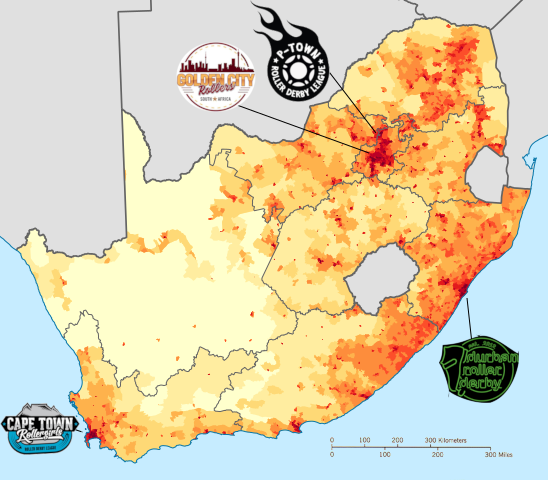
Map of South Africa's population density, with leagues marked. [Underlay: Htonl (Public domain, Wikipedia)]
South Africa is a large country - its area is about twice that of France - but with a relatively small population - about 80% that of France. And that population is very unevenly spread across the country: the dense province of Gauteng, containing Johannesburg and Pretoria, contains about a quarter of South Africa's entire population, with another fifth concentrated around Durban in the south-east province of KwaZulu-Natal, and a further eighth around Cape Town in the Western Cape.
Unlike in most European countries, then, the 4 leagues of South Africa - located in those 4 named cities - have difficulty even travelling to play each other on a regular basis.
Add to this the fact that the only other country with Roller Derby in Africa is Egypt, at the other end of the continent, and you can get a feel for how dedicated and unique the solutions adapted by the South African leagues have had to be.
In this article, we'll be discussing in some depth both those problems, and their solutions, so click on to read more:
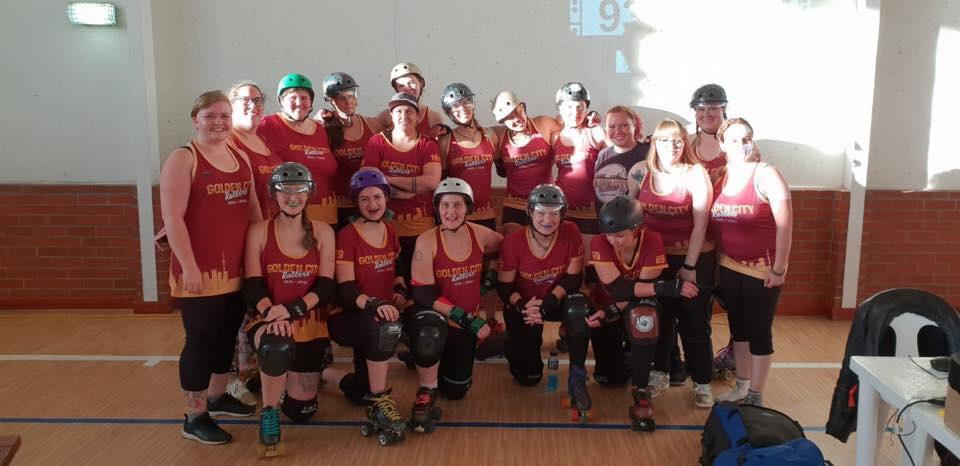
Golden City Rollers (at National Derby Fest 2018) [Photo: Mira 9 Photography]
The oldest league in South Africa, founded back in 2010, is Johannesburg's Golden City Rollers. Founded as C-Max Roller Derby, they changed their name to Golden City Rollers in late 2017, as part of an extensive rebranding. Golden City have outlasted a few leagues founded in the same period (for example, in nearby Vanderbijlpark, and in the Port Elizabeth coastal region), but it's been an up-and-down ride for them. At their peak, during the 2011/2012 season, Golden City had three full-strength home teams, and a travel team. At their lowest-ebb, they had just enough skaters to keep the travel team going.
This growth-then-correction is not unique to Golden City: Durban Roller Derby, 500km south-east, and on the coast, saw a similar pattern. From founding in 2012, they flourished to a peak of 3 home teams and even a fellow men's team in 2015, but currently sit at a more stable single-team structure.
In fact, retention is a problem which all the leagues cite, and there's one common underlying factor: cost. Roller skating is not a big thing in South Africa. With no local suppliers, every piece of kit has to be imported from outside the continent, adding significantly to the cost. Even if there were local suppliers, however, the average income in South Africa is much lower than that in the USA or Western Europe, so kit is an expensive luxury. (Less than half of the population of the country earns more than $7000 a year.)
The Derby Without Borders project has collected for Golden City Rollers previously,
- Golden City
- We have a decent amount of rental gear to get new skaters started. But, eventually, they would have to buy their own, and we usually lose a lot of recruits at this point - there are no local skate/gear manufacturers and we have to import everything, which is costly.
- Durban
- We often have great interest in open skate nights and awareness of the sport has grown over the years. Numbers dwindle when the cost of equipment is discussed. Although we have kit for freshies to use, they are encouraged to get their own. Other limitations have included travel from around Durban and practice times may conflict with other commitments.
The large requirements of most "standard" versions of Roller Derby, especially in terms of officiating, can impose a lower limit on viable population for an active league, so several of South Africa's are trying new things to keep visible.
Golden City's approach has been to look at a more home-brew solution for this:
- Golden City
- This year, we're looking at having round robin-style mini-games within the league to give skaters goals to work for while we build up our numbers again.
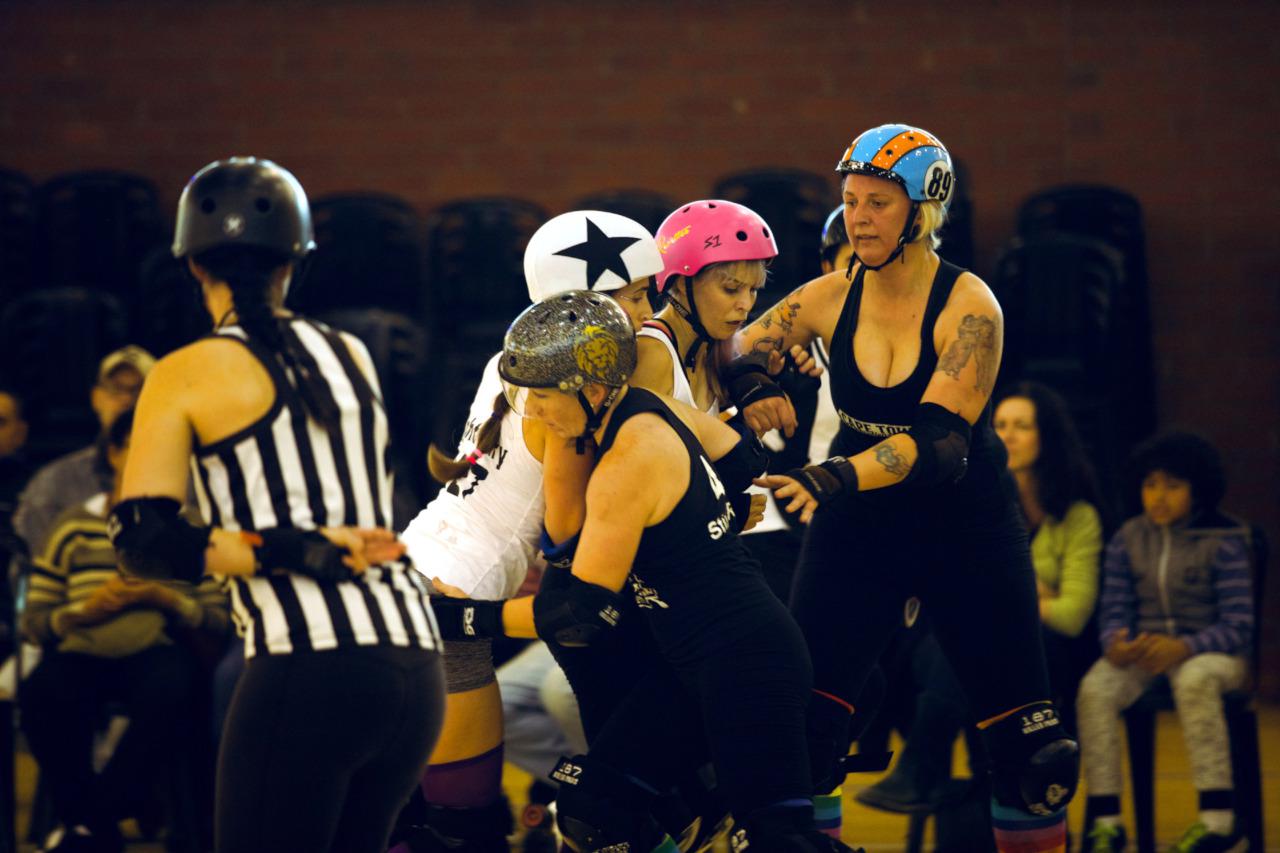
Cape Town Rollergirls' second Short Track Roller Derby Bout [Photo: Paul Fischer/Black Bird Production]
but Cape Town Rollergirls (CTR) have been trialling more established short-formats. In 2017, they held the first ever Roller Derby Sevens tournament in South Africa, and this year they've embarked on a series of public Short Track Roller Derby bouts.
- Cape Town Rollergirls
-
The Sevens and Short Track formats were fun and quite enjoyable! They were really our only options after the league's membership had reduced substantially.
Short Track has been especially useful as we struggle to retain and recruit officials. Usually anyone that is willing and able to participate wants to play and is needed for the roster! We haven't ever had full rosters, so we usually play with the minimum number of players for any given format. But the reduced number of officials in Short Track has allowed our very small membership to continue playing bouts.
The ability to hold regular home team games is important for all the leagues in South Africa, as the cost of even travelling to play each other is high, in terms of money and time. (And, whilst P-Town and Golden City are "only" an hour apart, the former is too small to play a full-size game at present.) [This is somewhat similar to the situation for some leagues in Australia, and even parts of the USA, where travel times can also be large, and "true" league structures are still relevant.].
That said, the South African community as a whole has organised an annual tournament - National Derby Fest - for the last three years. There's so far, there hasn't been a edition of it with all four leagues presenting full teams, but all four have attended - and contributed skaters to mixed teams, at least - each one. We've previously written about this in more depth, and we encourage readers to look out for the 2019 edition this November. The, currently rather informal, Roller Derby South Africa national committee organises the NDF - but we expect more to happen with RDSA in the future.
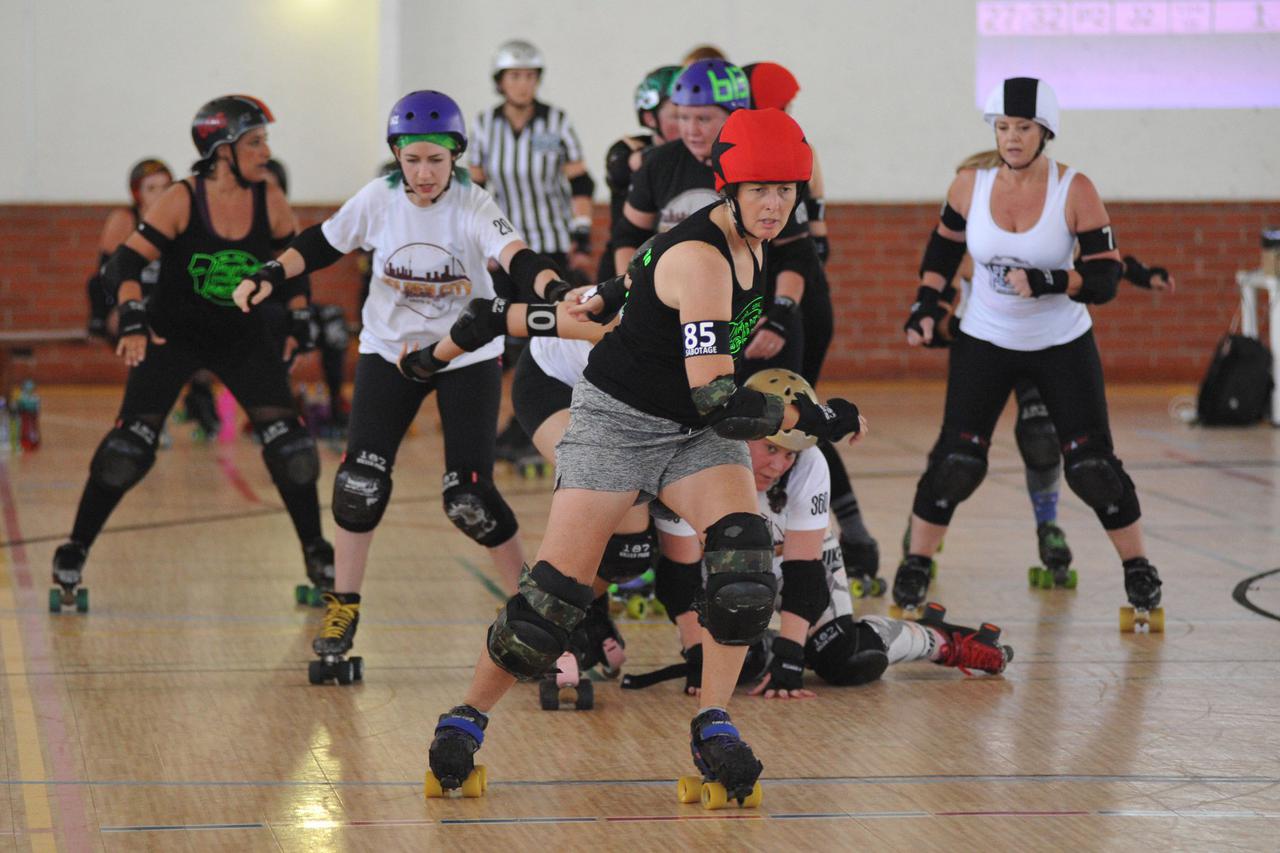
Skaters from Cape Town, Durban, Golden City and P-Town on track in one of the Black v White bouts at the 2018 National Derby Fest. [Photo: Mira 9 Photography]
Where they can't play actual Roller Derby, leagues have continued to engage with the community in any way they can whilst wearing skates. (Not entirely selflessly, given that the more people there are on skates in South Africa, the more potential recruits there are for Derby!)
Durban RD have been particularly active in this, hosting monthly Social Beach Skates along the long beachfront promenade. (Some of these also raise funds for other causes.)
CTR have found that open skate events, including roller discos, are by far their most effective sources of revenue, and now add one to the end of each of their intra-league events.
- Cape Town
- We've also taken to hosting roller discos after a Short Track bout. We wouldn't get the spectator numbers without it! And we wouldn't get the bouting experience with all the excitement and anxiety and preparation without knowing it was a public bout. So really, the two are always married for us. ... The roller discos are quite popular because there just isn't anywhere else to roller skate in the City! Plus, we have skates and safety gear we hire out, and most people don't have their own. We draw little kids right on up to members of old school roller rinks that host reunions with their skating pals from a couple decades ago! They ... have literally allowed our league to keep the lights on and doors open this year.
Similarly, Pretoria's P-Town Roller Derby, by far the youngest league (dating from just 2015), have been actively engaging with any means to increase their visibility (and that of the sport). As well as regular "FunSkate" open skating events, they've been increasing their visibility in other ways.
- P-Town
-
It is very hard to keep the sport alive, especially when people don’t really know what Roller Derby is. We have featured on Radio a couple of times, as well as hosted a couple of festivals where we feature Roller Derby.
We have also been involved with a [Rockabilly-themed event series] called Dusty Rebel and Bombshells, which also helped us get exposure.
Other problems are more diverse: for example, like 2x4 Roller Derby in Argentina, P-Town Roller Derby's main practice space is outdoors, which is fine unless it's raining, or winter!
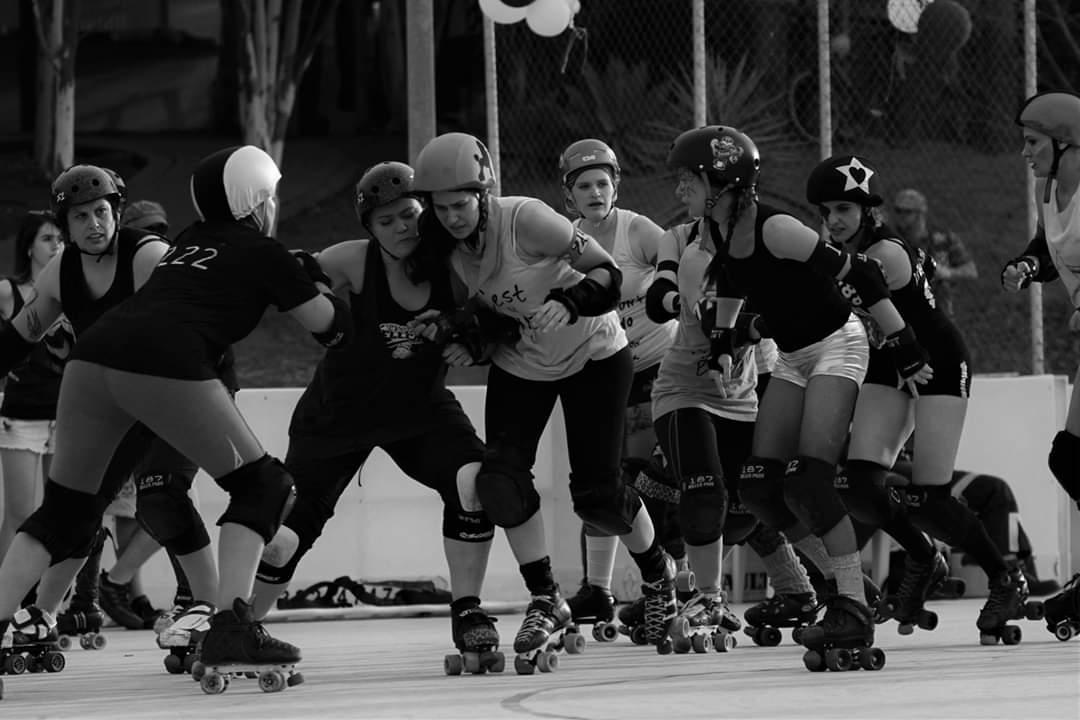
P-Town Roller Derby intraleague, Sept 2016 [Photo: Marko Van Der Zwan]
With the high relative cost of engaging in Roller Derby in South Africa comes a related issue in South Africa: inclusivity. Whilst around 80% of the population of South Africa is classed as "Black African" by the country's own demographics*, Black South Africans are also overwhelmingly more likely to be in poverty - about half of all "Black Africans" and 20% of "coloured" South Africans, compared to one or two percent of white South Africans. This inherently introduces a bias into the accessibility of an expensive sport like Roller Derby, and means that, at present, South African derby is much whiter than South Africa itself.
Even worse, there is also a large disparity within the South African population in terms of language (English is only the 4th most common first language in South Africa, with Zulu, Xhosa and Afrikaans all more widespread - and most Roller Derby resources are not available in any of those languages); and in terms of geographical segregation, with the poorer (and Black/POC) population tending to live in different, and often far-flung, places to the middle classes.
(This kind of coupled bias, of course, is not unique to South Africa, but South Africa has one of the highest levels of income inequality in the world, so the effect is even stronger here.)
All of the South African leagues are painfully aware of this bias, and have been attempting to tackle it with various initiatives.
- Durban Roller Derby
- Our skaters, although diverse in culture and race, all still come from a middle income economic group. We as a league do not have the funds to get other leagues started in different parts of KZN. This is especially true of previously underprivileged communities where talent is still to be sought. Our current Skaters now have the ability to afford skates and gear and drive up to one hour to practise. This is not possible for the majority of the female population in KZN.
Durban Roller Derby are developing a project alongside "Skate With Intention", a Durban-based project run by the local self-described "Girls Longboarding Crew", to support girls in underprivileged communities.
CTR, meanwhile, have taken the issue to heart more deeply, with a "Diversity and Inclusivity Committee" operating since 2017 to work on all aspects of recruitment, retention and support of all types of people in South Africa. At present, they're working on both cultural improvements (increased awareness of privilege and bias, and actively addressing issues when they arise; changes to their league Constitution where necessary to improve inclusivity) and exploring other avenues for tackling this complex problem.
Whilst we've talked about the problems of Roller Derby within South Africa, the elephant in the room is the problem of Roller Derby outside South Africa; or, rather, how far away all the rest of it is.
Every league we spoke to enthusiastically follows the international (by which they mostly mean the WFTDA Division 1) Roller Derby competitive scene.
- Golden City Rollers
- We literally count down the days to big events like Champs or Continental Cups so we can stream games. It's inspiring to watch skaters at a higher level of play - even if it's only on a screen!
- P-Town Roller Derby
- We look up to international players and teams, we try and stream as much of their games as possible and ask questions. They are happy to share any pointers. When we have international skaters visit, we welcome with open arms.
And, of course, there has been a South African National Team at both the 2014 and 2018 Roller Derby World Cups, Team ZA; the 2018 roster featuring skaters from Golden City, Cape Town, Durban and P-Town, as well as from further afield.
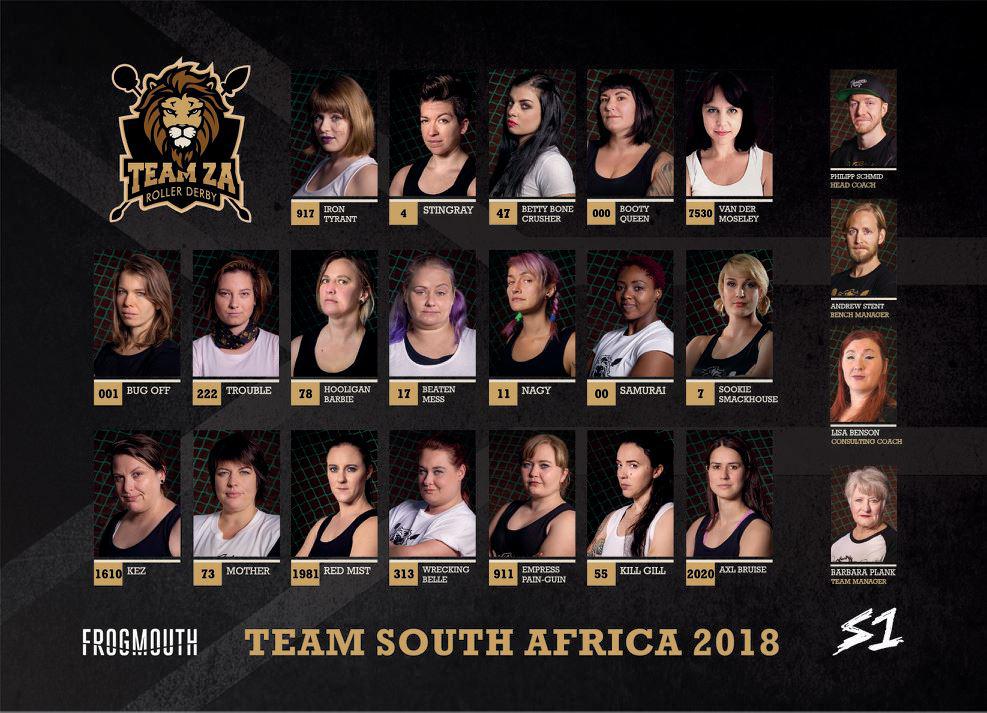
The official Team ZA 2018 roster photo.
However, Team ZA is literally the only time that most of the South African community have managed to play teams or skaters from outside their country: the closest non-South African leagues to each team are more than 6000km away!
- Golden City Rollers
- Besides a few clinics with international coaches, our only real contact with players in other countries has been at the World Cup so far.
As well as being the oldest team in South Africa, Golden City were also the only team to have joined the WFTDA, until this year: serving Apprenticeship from late 2014, and achieving full membership in early 2016. Given the lack of nearby existing WFTDA members, this required significantly more than the average dedication to achieve, as completing their "graduation" sanctioned bouts was a hugely expensive undertaking. Despite those same prohibitive costs having prevented Golden City from achieving a formal WFTDA rating and ranking since becoming members, the league still has this as their end goal. In the meantime, they value the connection to worldwide roller derby that membership gives them, and the (proportional, but small) influence that comes with it.
(As part of WFTDA's alteration of their league membership process in 2019, Cape Town Rollergirls became the second South African league to gain full membership, as all current Apprentice leagues were promoted to Full Members in order to clear the queue for the new system to be implemented.)
Golden City, of course, have a Flat Track Stats rating and ranking - but this is exceptionally stale as well, given the lack of games on record for them... but this is going to change very soon, if Egypt's only Roller Derby league have anything to do with it!
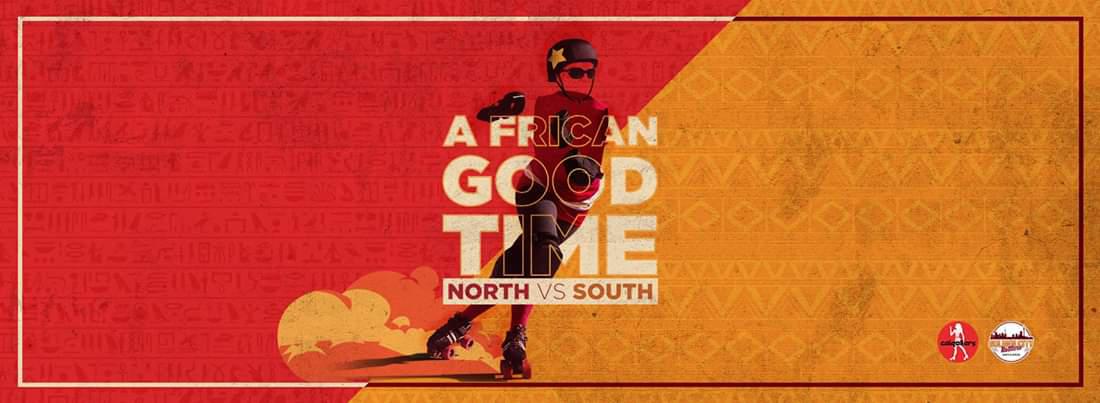
The Cairollers are raising funds to fly all the way from Cairo to Johannesburg, to play (at least) one game of Roller Derby - the first ever trans-African roller derby game in history. [We'd hope that this might be made more "value for money" by scheduling a few more games whilst they're over, but this is all highly dependent on funds at present].
You can donate to the Cairollers travel fund here: https://www.indiegogo.com/projects/cairollers-to-south-africa
Whilst some of the features of South African Roller Derby are unique to their location, or country; we hope that it's obvious that there's a lot of commonalities with other Roller Derby communities worldwide.
Eastern and Central Europe, Latin America and East Asia, face issues with the expense of importing kit from abroad, and the lack of a "skating culture". Many countries, from the USA, through Australia and indeed most of Europe, face issues with inequality and inclusion on "racial" and other demographic grounds. Almost every league has had, or will have, recruitment issues at some point in its existence.
We'd like to encourage the community to continue to talk to itself, worldwide, and share problems, and solutions, with leagues far apart, as well as close together.
* South Africa has five categories for demographic analysis of the population - "Black African", "Coloured", "Indian/Asian", "White" and "Other". Respondents to surveys must self-identify as one of these categories, for the purposes of census data; the actual self-identification of individuals who are classified as one of the first three categories varies with politics and age ("Black" and "People of Colour" being the usual identifications).
Thanks to: Dianne "DiFibrillator" Silva (Chair) & Delia "Deeablo" du Toit (Secretary) from Golden City Rollers; Rachael "StingRay" Allgaier (Admin Chair) from Cape Town Rollergirls; Lucia "Lunacy" de Almeida (Ex-Chair), Natalie "Chocovicious" Hendricks (Vice-Chair) and Trudy "Booty Trap" Fursman (Current Chair) from Durban City Rollers; and Laura "Misty" Pretorius (Marketing Head) from P-Town Roller Derby, for contributing to this article.
